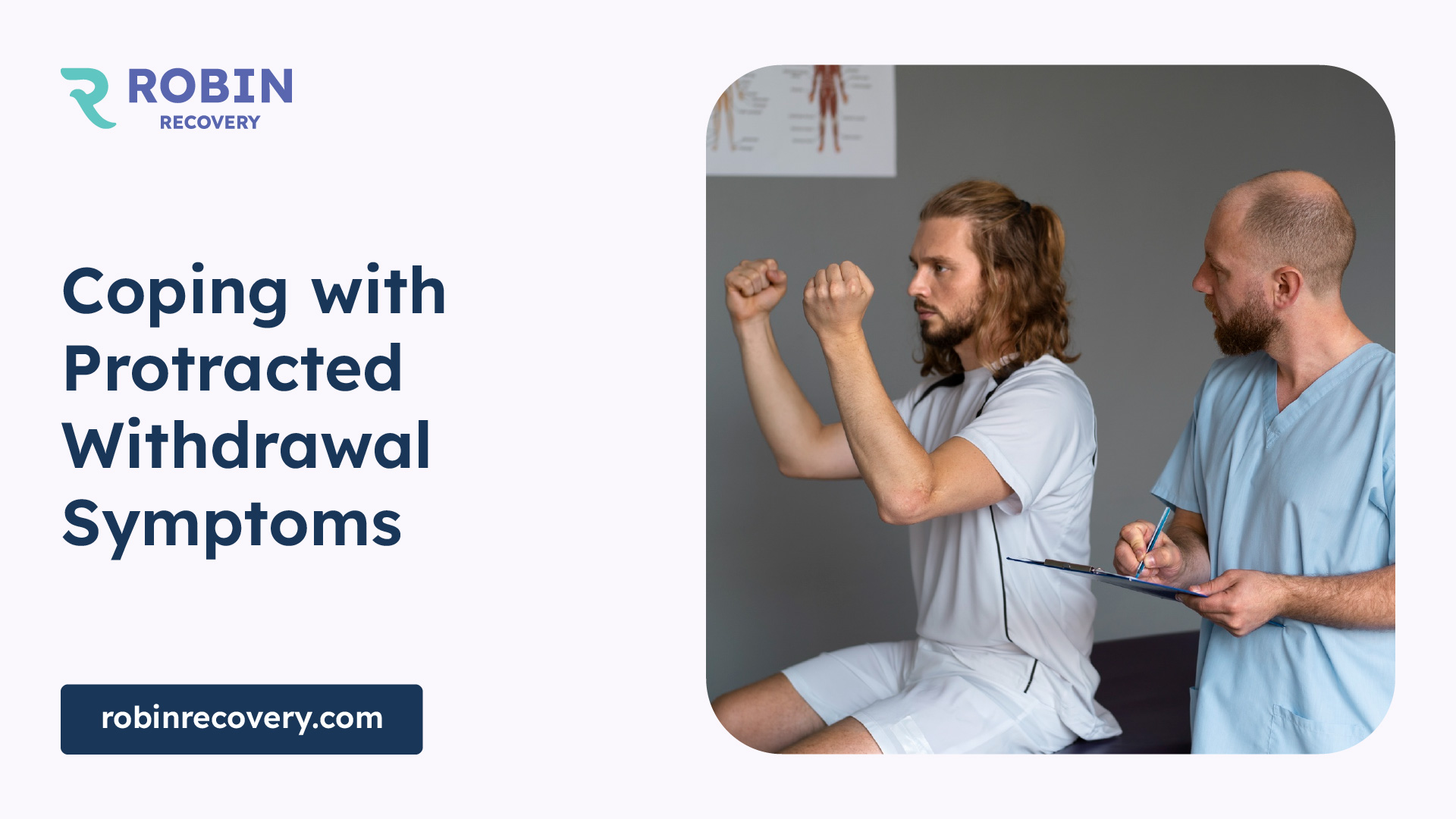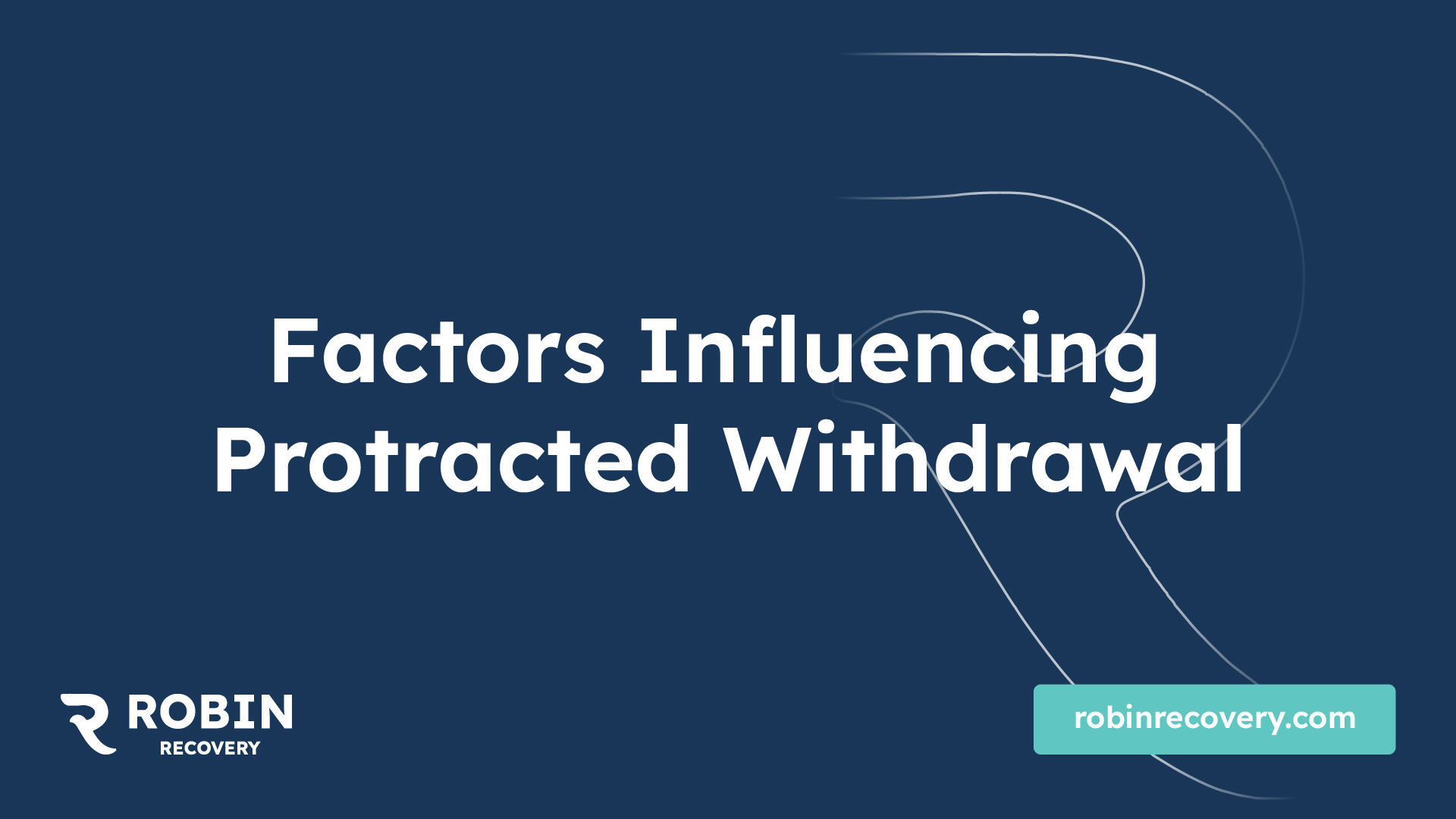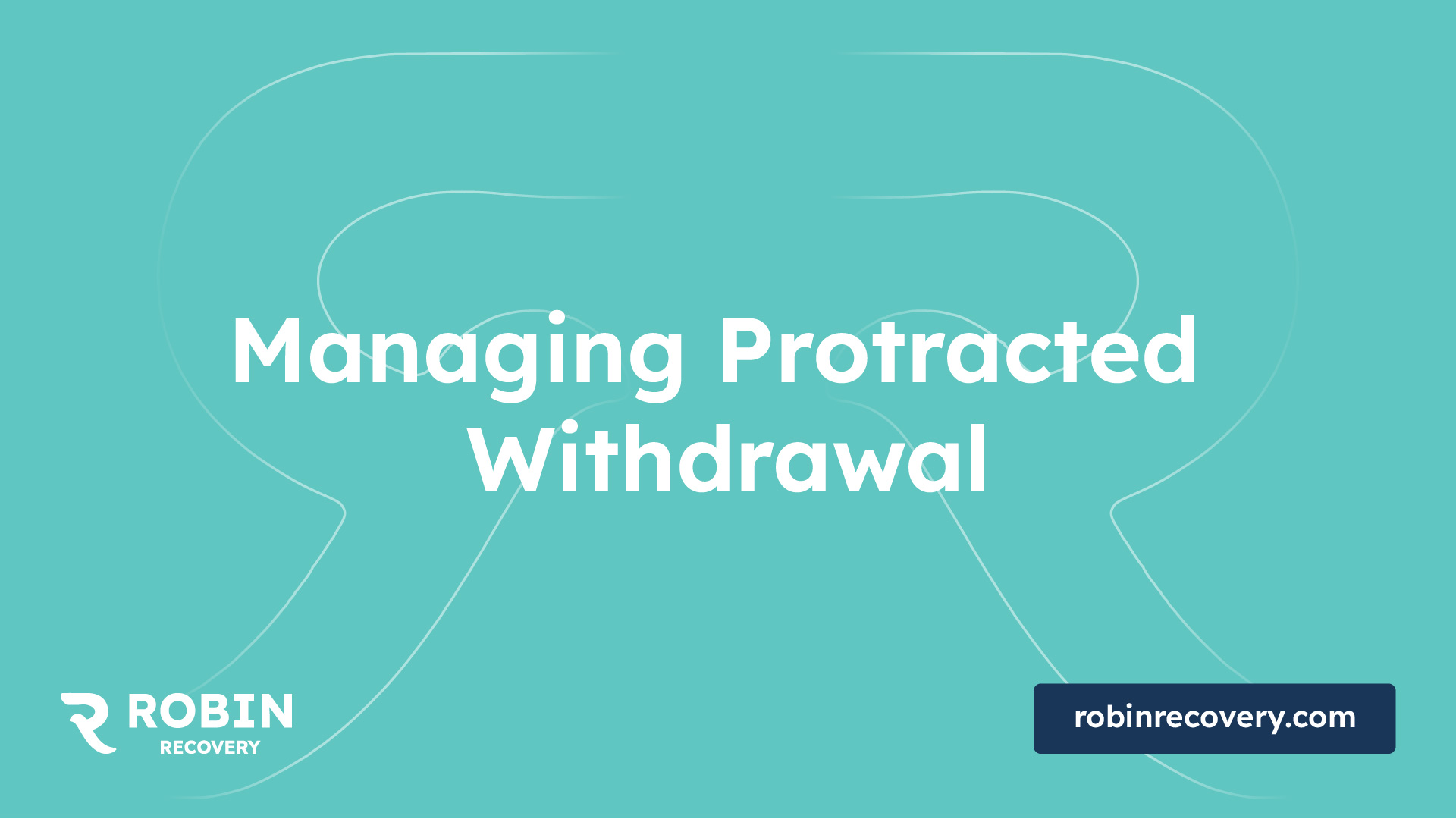Coping with Protracted Withdrawal Symptoms


Understanding Protracted Withdrawal
When it comes to addiction recovery, the journey doesn't always end with the completion of the acute withdrawal stage. For some individuals, a phase known as protracted withdrawal may follow, characterized by the persistence of withdrawal symptoms even after the body has healed from the physical effects of drug abuse. In this section, we will explore the definition of protracted withdrawal and its duration and persistence.
Definition of Protracted Withdrawal
Protracted withdrawal, also referred to as post-acute withdrawal syndrome (PAWS), occurs when withdrawal symptoms persist beyond the general acute withdrawal timeframes. It is important to note that protracted withdrawal is not a separate condition but rather an extension of the withdrawal process. The symptoms experienced during this phase can be substance-specific or non-substance-specific, meaning they can be common to acute withdrawal or evolve and appear well past the initial withdrawal period.
Protracted withdrawal symptoms can vary from person to person and may include emotional symptoms such as depression, anxiety, irritability, and mood swings. Additionally, individuals may experience physical symptoms like fatigue, insomnia, brain fog, and intense drug cravings. The severity and duration of these symptoms can vary depending on several factors, including the substance abused, the duration of abuse, and individual factors such as genetics and overall health.
Duration and Persistence
The duration of protracted withdrawal can differ from person to person, with some individuals experiencing symptoms for several months and others for a few years. The severity of prior substance abuse plays a significant role in the likelihood of experiencing protracted withdrawal symptoms. Those with a history of long-term substance abuse or those who consumed large amounts of substances are more likely to experience prolonged withdrawal symptoms [1]. The symptoms experienced during protracted withdrawal may come and go, evolve, or persist over time.
It is important to note that protracted withdrawal can be challenging to diagnose, as it is not currently included in the Diagnostic and Statistical Manual of Mental Disorders (DSM). The absence of formal recognition in the DSM has limited the research evidence available on protracted withdrawal, making it a complex and sometimes misunderstood phenomenon.
By understanding the definition and duration of protracted withdrawal, individuals in recovery and their loved ones can gain insight into the potential challenges that may arise during the post-acute withdrawal phase. It is crucial to seek support and guidance from healthcare professionals, therapists, and addiction specialists who can provide appropriate aftercare programs and relapse prevention strategies. For specific experiences with protracted withdrawal from substances like benzodiazepines and opioids, refer to the case studies and real experiences section of this article.
Protracted Withdrawal Symptoms
When individuals discontinue substance use, they may experience protracted withdrawal symptoms that persist for weeks or even months after the acute withdrawal phase. These symptoms can be categorized into emotional and physical symptoms.
Emotional Symptoms
Protracted withdrawal can have a significant impact on an individual's emotional well-being. Emotional symptoms may include:
- Anxiety: Feelings of unease, apprehension, and excessive worry that can be overwhelming.
- Depression: Persistent feelings of sadness, hopelessness, and loss of interest in activities once enjoyed.
- Irritability: Heightened sensitivity to stressors, leading to increased irritability, restlessness, and agitation.
- Mood swings: Rapid and intense changes in mood, ranging from euphoria to irritability or sadness.
- Intense drug cravings: Strong desires to use the substance, especially during periods of stress or emotional distress.
These emotional symptoms can be challenging to manage and may require support from mental health professionals. Developing healthy coping strategies and seeking therapy can play a crucial role in managing these symptoms.
Physical Symptoms
Protracted withdrawal can also manifest in various physical symptoms, which may include:
- Fatigue: Persistent feelings of tiredness, lack of energy, and a general sense of exhaustion.
- Sleep disturbances: Difficulties falling asleep, staying asleep, or experiencing disrupted sleep patterns.
- Gastrointestinal issues: Digestive problems such as nausea, stomach cramps, and changes in appetite.
- Sensory and motor issues: Changes in sensory perception, such as heightened sensitivity to stimuli or numbness, as well as motor coordination difficulties.
- Cognitive impairment: Difficulties with memory, concentration, and overall cognitive function.
It's important to note that the specific symptoms experienced during protracted withdrawal can vary depending on the substance abused and individual factors. For example, individuals going through heroin withdrawal may experience symptoms such as muscle aches, sweating, and increased heart rate in addition to emotional and cognitive symptoms.
Managing protracted withdrawal symptoms requires a comprehensive approach that may include aftercare programs and relapse prevention strategies. It is crucial for individuals to seek professional help and support from healthcare providers, addiction specialists, and support groups throughout their recovery journey. Additionally, some individuals may find alternative therapies and natural remedies helpful in alleviating symptoms, but it's essential to consult with healthcare professionals before attempting any alternative treatments [3].
By understanding the emotional and physical symptoms associated with protracted withdrawal, individuals can better navigate the challenges they may face during the recovery process. With the right support and resources, it is possible to manage these symptoms effectively and achieve long-term sobriety.

Factors Influencing Protracted Withdrawal
Protracted withdrawal, also known as post-acute withdrawal syndrome (PAWS), can be influenced by various factors. Understanding these factors is crucial in recognizing the duration and persistence of withdrawal symptoms.
Substance Abuse History
The severity and duration of protracted withdrawal symptoms can be influenced by an individual's substance abuse history. According to Turnbridge, individuals who have a history of long-term substance abuse or consumed large amounts of substances are more likely to experience protracted withdrawal symptoms. Chronic substance use can lead to changes in the brain that affect emotions and behaviors, persisting even after acute withdrawal symptoms subside.
Brain Chemistry Changes
The impact of substance abuse on brain chemistry is another factor that contributes to protracted withdrawal symptoms. Prolonged substance use can disrupt the balance of neurotransmitters and other chemicals in the brain, which can lead to lasting changes in emotional and cognitive functioning. These changes can persist even after the acute withdrawal phase, contributing to the protracted nature of withdrawal symptoms.
It's important to note that the specific duration and severity of protracted withdrawal symptoms can vary depending on the individual and the substance they were using. The research on protracted withdrawal symptoms, particularly for substances other than alcohol, is limited, with evidence primarily consisting of anecdotal reports [1].
Understanding the factors that influence protracted withdrawal can help individuals and healthcare professionals better manage and support those experiencing these symptoms. By recognizing the impact of substance abuse history and brain chemistry changes, appropriate strategies can be developed to address the challenges of protracted withdrawal and facilitate successful recovery. For more information about specific protracted withdrawal symptoms, refer to the sections on emotional and physical symptoms in this article.
Challenges of Diagnosing Protracted Withdrawal
Understanding and diagnosing protracted withdrawal can be a complex task. This section highlights two significant challenges when it comes to diagnosing this condition: exclusion from the Diagnostic and Statistical Manual of Mental Disorders (DSM) and limited research evidence.
Exclusion from DSM
One of the primary challenges in diagnosing protracted withdrawal is its exclusion from the DSM, which is widely used as a diagnostic reference in the field of mental health. The DSM provides criteria for diagnosing various mental disorders, but protracted withdrawal has not been included as a specific diagnosis. This exclusion makes it difficult for healthcare professionals to screen, diagnose, and discuss protracted withdrawal systematically.
Without a specific diagnostic category, individuals experiencing protracted withdrawal symptoms may find it challenging to receive appropriate recognition and support from medical providers. Anecdotally, patients with protracted withdrawal from substances like benzodiazepines often report disbelief or misdiagnosis when they complain of symptoms and their duration to medical professionals. The absence of a recognized diagnostic label can contribute to the frustration and confusion experienced by individuals seeking help.
Limited Research Evidence
Another significant challenge in diagnosing protracted withdrawal is the limited research evidence available, particularly for substances other than alcohol. While clinical observations and anecdotal reports suggest the existence of protracted withdrawal, the scientific literature on this topic is scarce [1]. The lack of rigorous scientific studies makes it difficult to establish clear diagnostic criteria, treatment guidelines, and a comprehensive understanding of the condition.
The limited research evidence also affects healthcare providers' awareness and knowledge about protracted withdrawal. Many medical professionals may not be familiar with this condition or its potential manifestations. Consequently, individuals experiencing protracted withdrawal symptoms may face challenges in finding healthcare providers who understand and can adequately address their needs.
To improve the understanding and recognition of protracted withdrawal, more research is needed to explore its causes, manifestations, and effective management strategies. Robust scientific evidence can help establish diagnostic criteria, guide treatment approaches, and enhance healthcare professionals' ability to support individuals dealing with protracted withdrawal.
In summary, the exclusion of protracted withdrawal from the DSM and the limited research evidence pose significant challenges in diagnosing and addressing this condition. Efforts to raise awareness, conduct further research, and advocate for the inclusion of protracted withdrawal in diagnostic guidelines can help improve the recognition and support available to individuals experiencing this challenging condition.

Managing Protracted Withdrawal
For individuals experiencing protracted withdrawal symptoms, it is important to have effective strategies in place to manage these symptoms and support long-term recovery. Two key components of managing protracted withdrawal include aftercare programs and relapse prevention strategies.
Aftercare Programs
Participation in aftercare programs is crucial for sustaining long-term recovery and reducing the risk of relapse. After completing a detoxification program, individuals may transition into an aftercare program to continue receiving support and guidance. Aftercare programs can vary in format and may include:
- Outpatient Treatment: Outpatient programs provide ongoing therapy and support while allowing individuals to live at home and maintain their daily routines.
- Support Groups: Support groups, such as 12-step programs or other recovery-focused groups, offer a sense of community and provide a platform for individuals to share their experiences and receive support from peers.
- Continuing Care: Continuing care programs offer a structured approach to recovery, providing ongoing therapy, education, and relapse prevention strategies.
These aftercare programs aim to address the challenges faced during the protracted withdrawal phase and provide individuals with the tools and support necessary for successful long-term recovery. Participating in aftercare programs can help individuals navigate the difficulties of protracted withdrawal and maintain progress on their recovery journey.
Relapse Prevention
Relapse is a concern for individuals experiencing protracted withdrawal symptoms. To minimize the risk of relapse, it is important to implement effective relapse prevention strategies. Some strategies include:
- Therapy: Continued individual therapy can help individuals address underlying issues that may contribute to substance use and equip them with coping mechanisms to manage cravings and triggers.
- Support Network: Building a strong support network is essential. This can include family, friends, support groups, and recovery coaches who provide encouragement, understanding, and accountability.
- Healthy Lifestyle: Engaging in healthy activities such as regular exercise, practicing stress management techniques (e.g., meditation, deep breathing), and maintaining a balanced diet can contribute to overall well-being and help manage withdrawal symptoms.
- Medication-Assisted Treatment: In certain cases, medication may be prescribed to help normalize brain chemistry and alleviate protracted withdrawal symptoms. This approach is most common for individuals experiencing withdrawal from substances such as opioids or benzodiazepines. However, it is important to consult with a healthcare professional to determine the appropriate course of action.
By actively engaging in aftercare programs and implementing relapse prevention strategies, individuals can increase their chances of successful recovery and manage the challenges associated with protracted withdrawal. It is important to seek professional help and support when needed to ensure a comprehensive approach to managing protracted withdrawal symptoms. If you or someone you know is struggling with withdrawal symptoms, reach out to local resources or helplines for guidance and support.
Case Studies and Real Experiences
To gain a deeper understanding of protracted withdrawal symptoms, let's explore two specific case studies: benzodiazepine withdrawal and opioid withdrawal symptoms.
Benzodiazepine Withdrawal
Protracted Withdrawal Syndrome (PWS) or Post-Acute Withdrawal Syndrome (PAWS) can occur in patients who have withdrawn from benzodiazepines and continue to experience long-term withdrawal effects. The term "protracted" refers to the duration, describing withdrawal symptoms that persist for months and even years after benzodiazepine cessation.
It is estimated that 10-15 percent of patients taking benzodiazepines long-term will experience protracted withdrawal or a "post-withdrawal syndrome." The risk of protracted illness is particularly high in individuals who abruptly stop taking benzodiazepines or are poly-drugged on multiple centrally active pharmaceuticals [4].
Symptoms that are most likely to be long-lasting in protracted benzodiazepine withdrawal include anxiety, insomnia, cognitive impairment, depression, various sensory and motor phenomena, and gastrointestinal disturbances [4].
Unfortunately, patients suffering from protracted benzodiazepine withdrawal often encounter disbelief or misdiagnosis when discussing their symptoms and their duration with medical providers [4]. This can make it challenging for individuals to receive the support and treatment they need.
Opioid Withdrawal Symptoms
Post-acute withdrawal syndrome (PAWS) refers to a group of symptoms that appear after the acute stage of opioid withdrawal. These symptoms primarily manifest as emotional and psychological issues, potentially increasing the risk of relapse for individuals with a history of opioid use [5].
PAWS is caused by changes in the brain due to prolonged drug use, leading to chemical imbalances during active addiction. Stressful situations and reminders of opioid use can trigger episodes of PAWS. Symptoms such as cravings, exhaustion, and cognitive issues may persist for an extended period, especially for individuals with other physical or mental health conditions [5].
The duration of PAWS varies, with symptoms typically emerging after the acute phase and potentially lasting for days, weeks, months, or even years after stopping opioid use. These symptoms can fluctuate unpredictably, resembling a roller-coaster, but tend to become less common during long-term recovery [5].
Coping strategies for managing PAWS include therapy (both individual and group), seeking support from relationships that encourage recovery (such as support groups and recovery coaches), and, in some cases, medical treatment to normalize brain chemistry and prevent PAWS symptoms.
By examining real experiences and case studies, we can better understand the challenges faced by individuals dealing with protracted withdrawal symptoms from benzodiazepines and opioids. It is crucial to provide support, understanding, and appropriate treatment options to those navigating the long road to healing.
References
[1]: https://americanaddictioncenters.org/withdrawal-timelines-treatments/post-acute-withdrawal-syndrome
[2]: /heroin-withdrawal-signs-symptoms-and-treatment
[3]: /can-herbs-help-with-benzo-withdrawal
[4]: https://www.benzoinfo.com/protracted-withdrawal-syndrome/
[5]: https://www.webmd.com/mental-health/addiction/opioids-post-acute-withdrawal-syndrome
